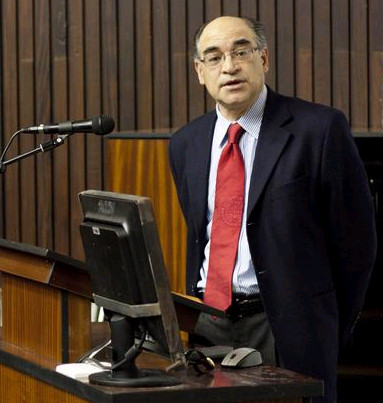
The Rhodes Faculty of Humanities is to hold a series of lunch time conversations that will critically reflect on the South African Lineages of Freedom as part of a national initiative to revive Humanities in the country.
The idea behind this Catalytic Project, organised in conjunction with the South African Humanities Deans’ Association (SAHUDA), will according to Prof Fred Hendricks, the Dean of Humanities at Rhodes, trace the various trajectories of liberation and repression and to reflect critically on the past as well as present.
The project will also highlight the on-going problems confronted by a post-apartheid South Africa. One of the post-apartheid issues that would be discussed and analysed is the recent Marikana massacre, where more than 40 people died, 36 mine workers, two police officers, four other unidentified persons and 78 injured.
Prof Hendriks believes that “the death of miners at Marikana at the hands of the police, will go down as one of the worst human tragedies in South Africa post-apartheid. It looms large as an example of an increasingly repressive state, notwithstanding the democratic changes since 1994. Although formal apartheid is dead in South Africa, it still continues to linger in all spheres of body politic.”
It has become important to undertake projects such as the Lineages of Freedoms conversations and colloquium as SAHUDA is of the view that humanities must be centrally involved in analysing significant events in the South African contemporary history such as the Marikana massacre.
The humanities played a crucial role against apartheid and there is now an urgent need for engaged scholarship which takes the struggles and problems of ordinary people seriously.
“There is clearly a need for us to think differently about our mission as university-based scholars in terms of the on-going problems and struggles in our communities. We must not only revive our own intellectual activity as academics in the humanities, but also make a sustained contribution to the public good,” says Prof Hendricks who is also president of SAHUDA.
South African universities are facing decline in humanities disciplines. The decline was highlighted by two reports released last year – one from the Department of Higher Education and Training (Charter for the Humanities and Social Sciences and the other from the Academy of Science of South Africa (Consensus Study on the State of the Humanities).
The two reports led to the formal establishment of SAHUDA and, at Rhodes, the new Unit for the Humanities at Rhodes University (Uhuru).
The mission of Uhuru, a research project funded by Andrew W Mellon Foundation, is to come up with new paradigms and approaches for a critical engagement with present conditions.
“The Uniqueness of Uhuru lies in the direct manner in which it has understood the reasons for the decline and the ways in which it plans to make a contribution to reversing this trend. It is a bold and ambitious step towards generating knowledge directly connected with the challenges of our society,” says Prof Hendricks.
The Lineages of Freedoms conversations will be held from Monday (15 Oct) to Friday (19 Oct), in the Eden Grove Blue Lecture Theatre at Rhodes, starting every day at 13h05. The lunch time talks will be followed up with a full one day colloquium on Emancipatory Traditions to be held also at Rhodes on Saturday 20 October 2012.
Photo by Desiree Schirlinger
